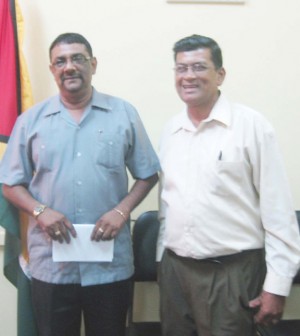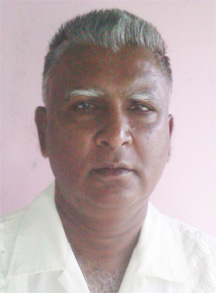David Armogan was yesterday elected Chairman of the Regional Democratic Council (RDC) of Region Six and promised to work faithfully to improve the lives of the people although he said he could not “wave a magic hand” and transform the region.
Armogan was voted in unanimously at the election held yesterday at the RDC boardroom while the new vice-chairman Bhupaul Jhagroo was nominated for the post and won against Donna Mathoo of the Alliance For Change (AFC). He noted that he was “aware of the new dispensation of the politics of our country; the people want us to work in harmony and unity and so I extend that hand of friendship to all the members of the opposition. We must work together to improve this region.”
The councillors from all the parties congratulated the new chairman and promised to work together with him to develop the region. They also expressed confidence that he would serve the region well.

AFC representative Michael Carrington told Armogan he was “looking to see the independence of the councillors; our councillors did not oppose you.”
Referring to Mathoo losing the vote as vice-chairman, Carrington said he knows “how politics go in Guyana” and hopes that “in the next six years, things would change and people would be free to vote as how they like.”
A representative of A Partnership for National Unity (APNU) Edith Bynoe, of Tucber Park, New Amsterdam, said she learnt that Armogan was “a man of action” and that work would be done in New Amsterdam as well. She too felt that Mathoo should have been given a chance to serve as vice-chairman because “women are good thinkers and like to put their thoughts into action.”

AFC councillor Rohan Jagesshar, who hoped that they would work as a team, was aware that the council “cannot satisfy everyone at the same” and that the new members have to “work within limitations.” He asked the chairman not to “make promises that cannot be fulfilled.”
A member of the APNU, Kerwin Crawford, called on the chairman to “mash the brakes” against corruption and pledged that he would be behind him to do so. Armogan responded that he “would not tolerate corruption.” He said all councillors would be given the opportunity to express their “ideas and their opinions freely once it is done with civility and decorum.”
According to him, “Sometime in your life you are called to do tasks which you have little experience to do but once people are prepared to work with you and once you have the support of the people [councillors]… I’m sure we would be able to move this region forward.”
He acknowledged that the past chairman did a lot of work in the region but there is still a lot more work to be done.
Armogan, who served as a councillor and as chairman of the health and education committees in the region for 14 years, thanked all the councillors who showed the confidence in electing him. He has found the past chairman, Zulfikar Mustapha to be efficient and he “tried his best in all circumstances.”
He added that “sometimes our best efforts do not seem to meet the rising expectations of our people” and that he came into the position fully aware of that.”
Criticisms
As chairman, he said he has recognized that the job is not going to be an easy one and that it would be difficult to “please all the people all the time, so criticisms would be in order… My friends have advised me that I have to develop thick skin [and] I’m trying to do that.”
He lamented too that “everybody wants something done and they want it done in a hurry. But things can only be done with whatever resources are available.”
Jhagroo said he was happy to be given the opportunity to serve, not only in villages as he had done in the past but in the region. He acknowledged that the previous administration has done a lot and he hoped that its work would not go in vain.
Minister of Natural Resources and Environment Robert Persaud said Armogan, who is a successful businessman, has made some sacrifices in accepting the position after the party offered it to him. Mustapha, he added, has seen the region undergoing positive changes and has seen thousands of acres of new land being opened up and improvements in the drainage and irrigation systems. According to Persaud, the People’s Progressive Party leadership was “a bit disheartened” when he said it was time for someone else to take the position.
In his brief remarks, Mustapha said he wanted to move forward because he did not want to be in one place too long and would be happy to serve in his new positions in regions Five and Six. He assured the new chairman that he can “count on me anytime for advice and support; I would be 100% behind the RDC so that all of us can put our shoulder to the wheel… and move Region Six, move Guyana so that we can improve the lives of the citizens of this country.”
The Region Six councillors who were sworn in include: Anil Beharry, Hazrat Hussain, Bevon Sinclair, Gloria Beharry, Erwin Abdulla, Naeem Muhammed and Bijulee Moti.
Political observers say the comparatively poor result for the PPP/C in the region made it necessary for change in the party hierarchy as was the case after the 2006 elections.
Region Five
Meanwhile, in Region Five, Bindrabhan Bisnauth was elected the new chairman while Rion Lansdale Peters was elected vice-chairman. They both were elected over APNU councillor Carol Joseph. Bisnauth takes over from long-serving PPP/C Chairman Harrinarine Baldeo.
Bisnauth told Stabroek News that he would “bring a lot experience to the job,” having served as regional councillor from 1997, chairman of the education committee and procurement board member for several years.
He was also the chairman for the Mahaicony-Abary Neighbourhood Democratic Council and farm manager of the Burma Rice Research Station/Guyana Rice Development Board.
He said too that he would have an “open-door policy and would work for the betterment of all the citizens.” He also promised that his administration would also “visit and interact with every community.”
He knows that “the demands would be far above the budgetary allocations but we would try our best with the limited resources.”




